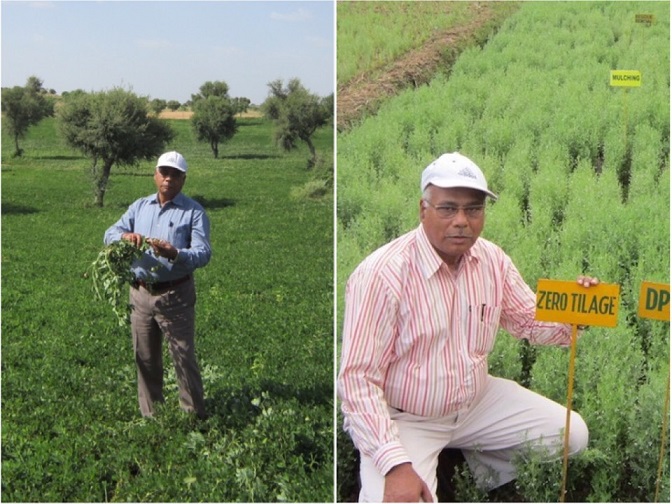
There are reasons to believe Agriculture in India is terribly sick and dying, put on ventilator and oxygen in the name of cash dole to 95 million farmers. Access to required resources, critical inputs are limited to handful of rich farmers mostly in the states of Punjab, Haryana and and Gujarat. Some 405 million smallholder, marginal farm families in the states of Bihar, Tripura, UK, UP & WB are getting deeper into debt-trap as their monthly income exceeds expenses, just to survive !
Indian policy makers are tuned to walk on silky road using prime land for record/surplus production of cereals, even allowing the produce to rot. Whereas, oilseeds and pulses continue to break heads on drylands, paving way to import oils worth Rs. 73,000 million and pulses worth Rs. 102,000 million annually but remain out of reach to the people at grassroots level with almost no purchasing power. Consequently, India has turned into a home of 193 million malnourished and 238 million underweight where Dal and Oils are luxury items to them.
Needless to say, it’s a lopsided agricultural policy having no state-wise balanced crop production plan meeting overall requirements of essential commodities, though agriculture is a State Subject. It mimics to a musical chair game, where any state can produce anything they like with no interventions of NITI Aayog but Govt at the Centre stands liable to buy at minimum support price (MSP). Such unplanned tapping of natural resources, groundwater; indiscriminate uses of chemical fertilisers, pesticides to select crops cannot continue for long from sustainability point of view. The health of agriculture in an agrarian county is supreme and here is the basic prescription proposed to PM as back as 2017 to recharge agriculture, remained unattended.
However, issue based specific treatment as suggested here should bring agri sector out of ventilator and therefore, back to health enabling to stand on its own foot.
- Good seed is the key to good agriculture. Govt Seed Agencies must stop buying seed through tenders and supply poor quality seeds to farmers.
- Agriculture being a State Subject, fixation of MSP may be done by the states as the cost of cultivation varies from state to state and so also the procurement by local agencies.
- Food processing industries including edible oil manufacturers should be asked to procure raw materials from within the county following MSP.
- The Associations dealing with agri commodities must plan to optimise production and provide incentives to farmers than guiding govt just for imports/ exports.
- A centralised Cess Fund for Pulses and Oilseeds may be created with matching contributions from Commodity Association and related Food and Oil industries.
- Special Agricultural Cess may be collected on food items served right from parliament canteen to hotels/restaurants and spent to support the cause of smallholder farmers dealing with pulses and oilseeds.
- Impose 5 years moratorium on exports of water guzzling crops and more particularly broken-rice and sugar.
- With the diminishing agricultural lands for rapid urbanisation and ever increasing population, engage a task force suggesting to make use half of arable lands lying vacant to feed people and create work opportunities.
- Mission ‘Doubling of Farmers Income’ must be achieved before 2024 and the commitment fulfilled.
- Decentralisation of agricultural set up from Delhi to different regions and elimination of dichotomy in agricultural research between ICAR and SAUs.
Finally, Govt of India may declare Agriculture as National Activity and PM may inaugurate planting of Nutri-Cereals during rainy season and Oilseeds/Pulses in post-rainy, in the line of celebration Yoga, every year.
Dr Mukti Sadhan Basu is a former director of the National Research Centre for Groundnut, Indian Council of Agricultural Research. He was also International Consultant on Aflatoxin Management, UNIDO and worked in Africa in that capacity. Presently he is Managing Director of SBSF Consultancy.